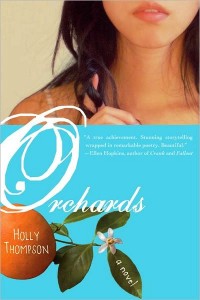JQ Magazine: Book Review – ‘Orchards’ Is Elegant, Powerful, Profound

“‘Orchards’ is at once a celebration of life and a somber reflection on the choices we make and their often irrevocable consequences.” (Random House)
By Sharona Moskowitz (Fukuoka-ken, 2000-01) for JQ magazine. Sharona is interested in fresh, new voices in fiction and creative nonfiction.
Meet Kanako Goldberg. Half Japanese, half Jewish, the teenage narrator of Holly Thompson’s breathtaking 2011 novel Orchards is more bagels and lox than natto and rice. After the suicide of her classmate in New York, Kanako is sent by her Japanese mother to spend the summer with her relatives on their mikan farm in a rural village tucked beneath the shadows of Mount Fuji. The trip to Japan is not only a chance to bond with her Japanese kin, it’s something of a temporary exile, a time to reflect on her life and her classmate’s untimely death at a safe geographical remove.
The victim’s name was Ruth and she is evoked repeatedly throughout the novel in the second person, as if to haunt the reader as much as she seems to be haunting Kanako’s conscience. Who was Ruth? What exactly was the extent of her suffering and how long did she have to endure before making the desperate decision to take her own life? Slowly we learn about Ruth’s battle with bipolar disorder and the unfortunate events that prompted her to do the unthinkable.
Despite her remorse, Kanako was not exactly the bully. She was more of a neutral bystander neither provoking nor defending the tortured teen, though in retrospect she feels just as culpable as Lisa, Ruth’s lead tormentor. (Lisa’s own fate, which I won’t give away here, adds an unexpected twist to the story.)
The tragic event took place in an apple orchard, a place where the cycle of death and rebirth is in plain, colorful view. While this metaphor might seem forced or terribly obvious, so elegant is Thompson’s language and so powerful and gentle her analogies that the overall effect is profound and genuinely moving.
Kanako’s life during the summer on the mikan farm feels at first like cruel and unusual punishment. She is made to wake at the crack of dawn to strip the fruit trees, follow a diet that’s unfamiliar and to her, insubstantial, and bathe in the same twice-used bathwater as her uncle and cousin. She reacts by sneaking sweets from a secret stash she has hidden away, a habit that causes her even more guilt and self-censure.
The farm’s daily routine is demanding and full of activity, though Ruth is never far from Kanako’s thoughts. Her guilt festers beneath the surface as the dead girl’s ghost seems to hijack her every thought, particularly around the time of Obon, the Japanese festival in which families convene to commemorate their deceased ancestors. Kanako observes the lit paper lanterns meant to guide the path for the spirits to return and wonders, “If we could invite distant spirits to join in the celebrations here and if I did invite you, Ruth…would you come?”
In what is arguably one of the novel’s most striking scenes, Kanako’s inner conflict plays out when she observes a female Japanese middle school student being taunted by a group of classmates. Her own experience with Ruth is automatically conjured and, as if in a plea for penance, she tries desperately to befriend the girl. As one might expect, though, the bullied teen is timid and psychologically scarred, refusing Kanako’s overtures in a stark reminder that there are no do-overs in life.
Thompson chooses her words with great care for maximum impact and as a result, her streamlined prose is almost deceptively spare. Orchards is at once a celebration of life and a somber reflection on the choices we make and their often irrevocable consequences. With its strong narrative voice and poetic style, the novel is an argument against keeping silent when speaking up would be the right thing to do. Orchards is truly a stunning display of language and a much-needed piece of advice writ large.
Visit Holly’s homepage at www.hatbooks.com.


Comments are closed.